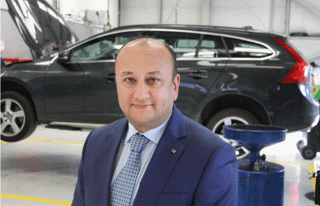Light commercials vehicles, however, offer retailers an alternative revenue stream that has been surprisingly buoyant over the past couple of years. While manufacturers have been battered by hostile press over passenger car pricing, vans have not faced the same level of negative publicity.
“There is much less pressure on pan-European pricing for LCVs because it is not as attractive a subject for the media,” says John Watts, CAP Network product manager, Commercial Monitor. “It's a good market for car dealers as long as they approach it in the right way.”
Approaching the market in the right way means not rushing to make a quick buck, however. Margins on standard vans are actually no better than those achievable on cars - much of the profit comes from selling the options and accessories. Operators are also demanding car-like comfort in their vans, such as aircon, and high levels of security. This is another profitable part of the business.
Vauxhall, which recently launched a two-tier van franchise network, has trained all its LCV dealers to help them understand the needs of van operators after realising many operators purchased a standard van and took it to a specialist to get add-ons and accessories fitted. “Now our dealers are encouraged to find out more about what the van will be used for, so they can sell and fit additional accessories as required,” says Vauxhall national van sales manager Ian Hucker. “This is more attractive for the customer and also keeps the profit within the dealership.”
Retailers must be prepared to completely alter their sales approach to succeed in the van market. The SMMT's CV development manager Robin Dickeson says salesmen must be prepared to get out of the showroom and knock on the doors of local companies if they want to prosper. “They will be competing against rivals who are doing the same,” he says. “Product knowledge in this situation is very important, but salesmen also need to have a clear understanding of what an operator wants from the vehicle. Key to success in the van market is repeat business.”
Unlike the car market, where emotion plays a major role, the decision to purchase a light commercial vehicle is driven by functionality and cost of ownership. Consequently, vans tend to be kept for a much longer period - in some cases up to 10 years - before they are changed. Smart retailers should therefore appoint a specialist with detailed product knowledge - there are hundreds of model derivatives - and must be prepared for much slower stock turnover than cars.
Volume is essential as margins are tight, but dealers only need to establish relationships with a few mini fleets to ensure reasonable returns. And, as long as they sell the right van for the right needs, repeat business will generate part-exchanges for the second hand market.
Don't be blinkered by focusing purely on sales, though. The aftersales opportunity is massive - vans cover more mileage than cars, typically 30,000-40,000 a year, which means extra visits to the dealership for servicing and more parts sales. Investment is needed in specialist diagnostic tools and ramps that can accommodate heavier vehicles, but it is a closed market. Van operators tend to be loyal to the dealership, particularly with many manufacturer warranties now set at three years, and there is less competition from fast-fit operators.
Light commercials tend to be split into two categories: revenue earners, for example those used to deliver parcels, and semi-service vehicles, like those used by plumbers. Each is essential to the business, and repair/service downtime must be minimised. The pressure for out of hours servicing has compelled dealers to established dedicated van teams who understand and can cope with the problems of overnight parts deliveries and guaranteed repair periods.
But the growing pressure from van operators for extended aftersales opening hours should be viewed as an opportunity, not an imposition. “The trick is to get the aftersales support right for the LCV operator by servicing at night and at the weekend,” says CAP's John Watts. “It's no good just offering courtesy vehicles because they won't meet specialist operators' needs.” Some companies are developing repair and maintenance packages, helping to tie-in business to the dealership. These schemes are highly popular with van operators because it allows them to better manage and control their expenditure.
















Login to comment
Comments
No comments have been made yet.